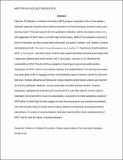Files in this item
Qualitative evaluation of the Mentors in Violence Prevention pilot in Scottish high schools
Item metadata
| dc.contributor.author | Williams, Damien John | |
| dc.contributor.author | Neville, Fergus Gilmour | |
| dc.date.accessioned | 2016-01-28T12:40:04Z | |
| dc.date.available | 2016-01-28T12:40:04Z | |
| dc.date.issued | 2017-04 | |
| dc.identifier | 240565918 | |
| dc.identifier | cfab0852-2d4c-406c-9b30-1671f7279439 | |
| dc.identifier | 84962707711 | |
| dc.identifier | 000399094800005 | |
| dc.identifier.citation | Williams , D J & Neville , F G 2017 , ' Qualitative evaluation of the Mentors in Violence Prevention pilot in Scottish high schools ' , Psychology of Violence , vol. 7 , no. 2 , pp. 213-223 . https://doi.org/10.1037/vio0000046 | en |
| dc.identifier.issn | 2152-0828 | |
| dc.identifier.other | ORCID: /0000-0001-7377-4507/work/57568410 | |
| dc.identifier.uri | https://hdl.handle.net/10023/8092 | |
| dc.description.abstract | Objective The Mentors in Violence Prevention (MVP) program originated in the US and adopts a bystander approach to gender-based violence prevention by harnessing group processes using a peer-learning model. This paper presents the first qualitative evaluation, within a European context, of a pilot application of MVP within a Scottish High School setting. Method The evaluation comprises a series of interviews and focus groups with school staff, and pupils (‘mentors’ and ‘mentees’) at three participating schools. The study’s research purposes are to explore: 1. Experiences of participating in MVP; 2. Participants’ perceived impact of MVP (with regards attitudinal and behavioral change with a particular emphasis upon social norms); and 3. Participants’ opinions on the relevance and sustainability of MVP. Results All three categories of participant reported generally positive experiences of MVP in terms of recruitment, training, and implementation. The peer-learning model was particularly useful in engaging mentees, and facilitating support networks outside the classroom. Moreover, positive attitudinal and behavioral change regarding gender-based violence was reported by all three participant categories, but was particularly prevalent amongst mentors. However, participants highlighted the importance of ensuring MVP is culturally relevant, and the need for integration into school life to ensure its sustainability. Conclusions An initial qualitative analysis of MVP within Scottish High Schools suggests the peer-learning program was experienced positively, with self-reported impact on gender-based violence attitudes and behaviors (including bystander intervention). A number of recommendations have been made to inform future implementation of MVP, and the need for robust, on-going evaluation. | |
| dc.format.extent | 431358 | |
| dc.language.iso | eng | |
| dc.relation.ispartof | Psychology of Violence | en |
| dc.subject | Violence prevention | en |
| dc.subject | School | en |
| dc.subject | Intervention | en |
| dc.subject | Evaluation | en |
| dc.subject | Qualitative | en |
| dc.subject | Norms | en |
| dc.subject | B Philosophy. Psychology. Religion | en |
| dc.subject | RA0421 Public health. Hygiene. Preventive Medicine | en |
| dc.subject | RC0321 Neuroscience. Biological psychiatry. Neuropsychiatry | en |
| dc.subject | RJ Pediatrics | en |
| dc.subject | NDAS | en |
| dc.subject | SDG 3 - Good Health and Well-being | en |
| dc.subject | SDG 5 - Gender Equality | en |
| dc.subject | SDG 16 - Peace, Justice and Strong Institutions | en |
| dc.subject.lcc | B | en |
| dc.subject.lcc | RA0421 | en |
| dc.subject.lcc | RC0321 | en |
| dc.subject.lcc | RJ | en |
| dc.title | Qualitative evaluation of the Mentors in Violence Prevention pilot in Scottish high schools | en |
| dc.type | Journal article | en |
| dc.contributor.institution | University of St Andrews. School of Medicine | en |
| dc.contributor.institution | University of St Andrews. WHO Collaborating Centre for International Child & Adolescent Health Policy | en |
| dc.contributor.institution | University of St Andrews. Public Health Group | en |
| dc.contributor.institution | University of St Andrews. School of Psychology and Neuroscience | en |
| dc.contributor.institution | University of St Andrews. Centre for Minorities Research (CMR) | en |
| dc.identifier.doi | https://doi.org/10.1037/vio0000046 | |
| dc.description.status | Peer reviewed | en |
This item appears in the following Collection(s)
Items in the St Andrews Research Repository are protected by copyright, with all rights reserved, unless otherwise indicated.

